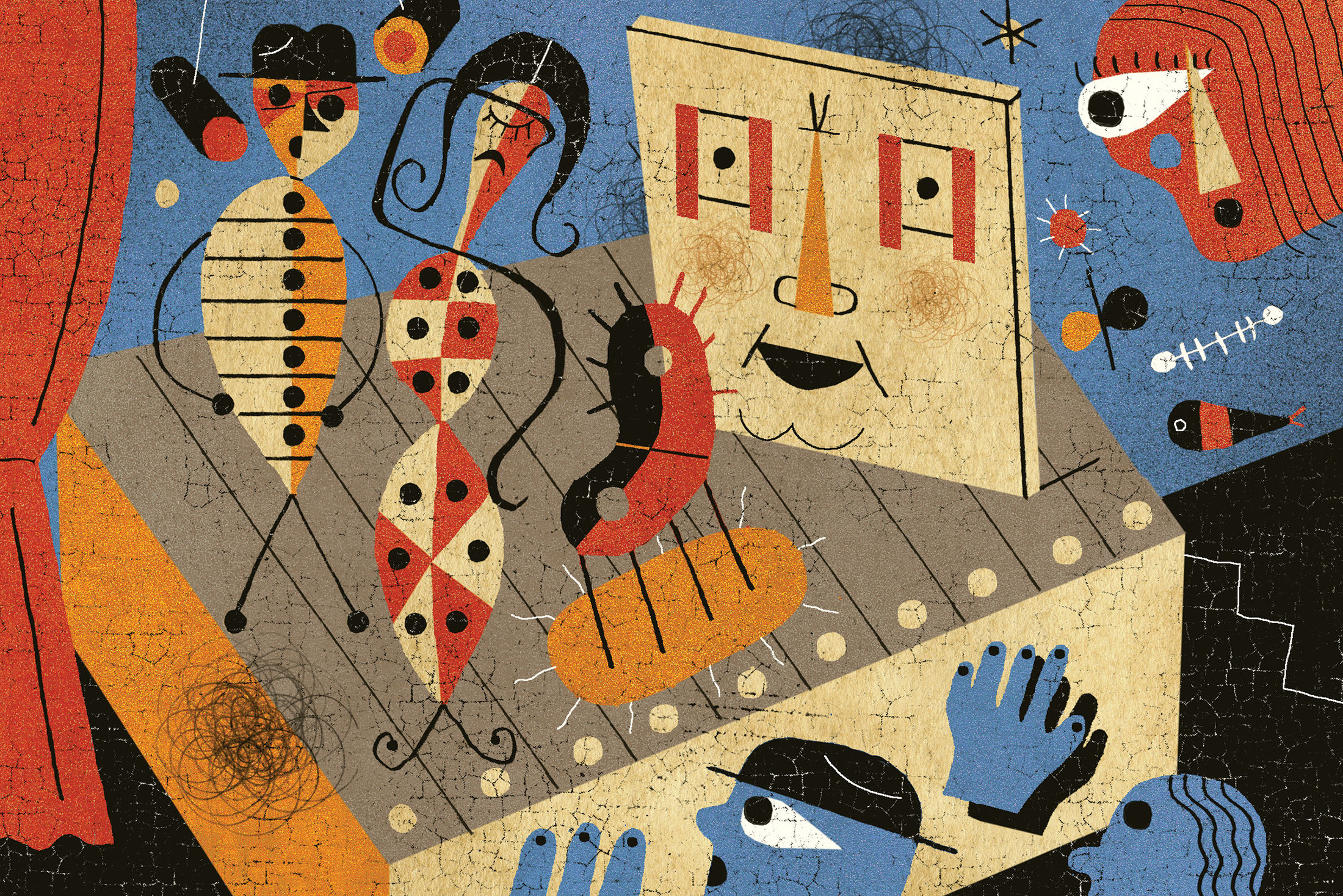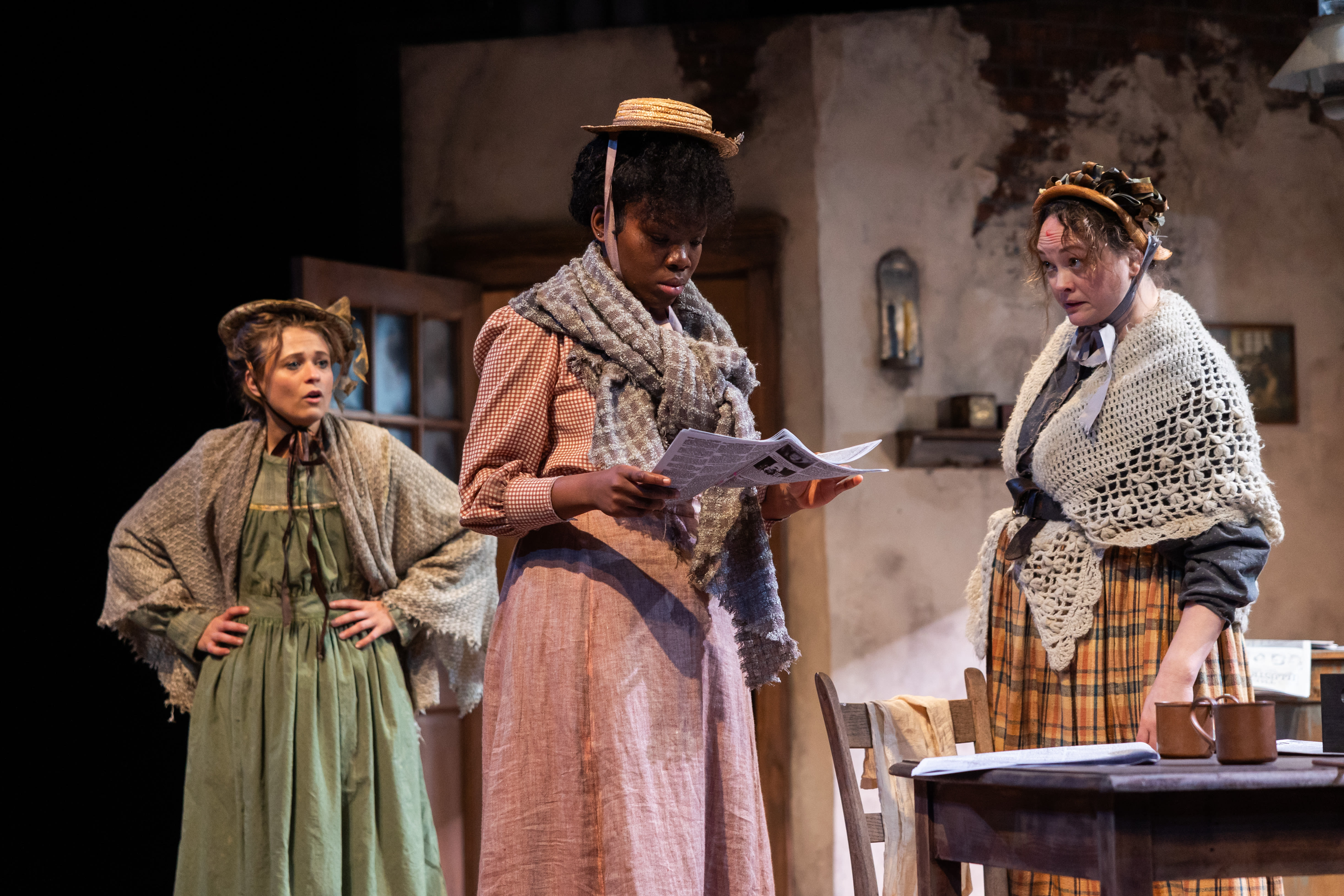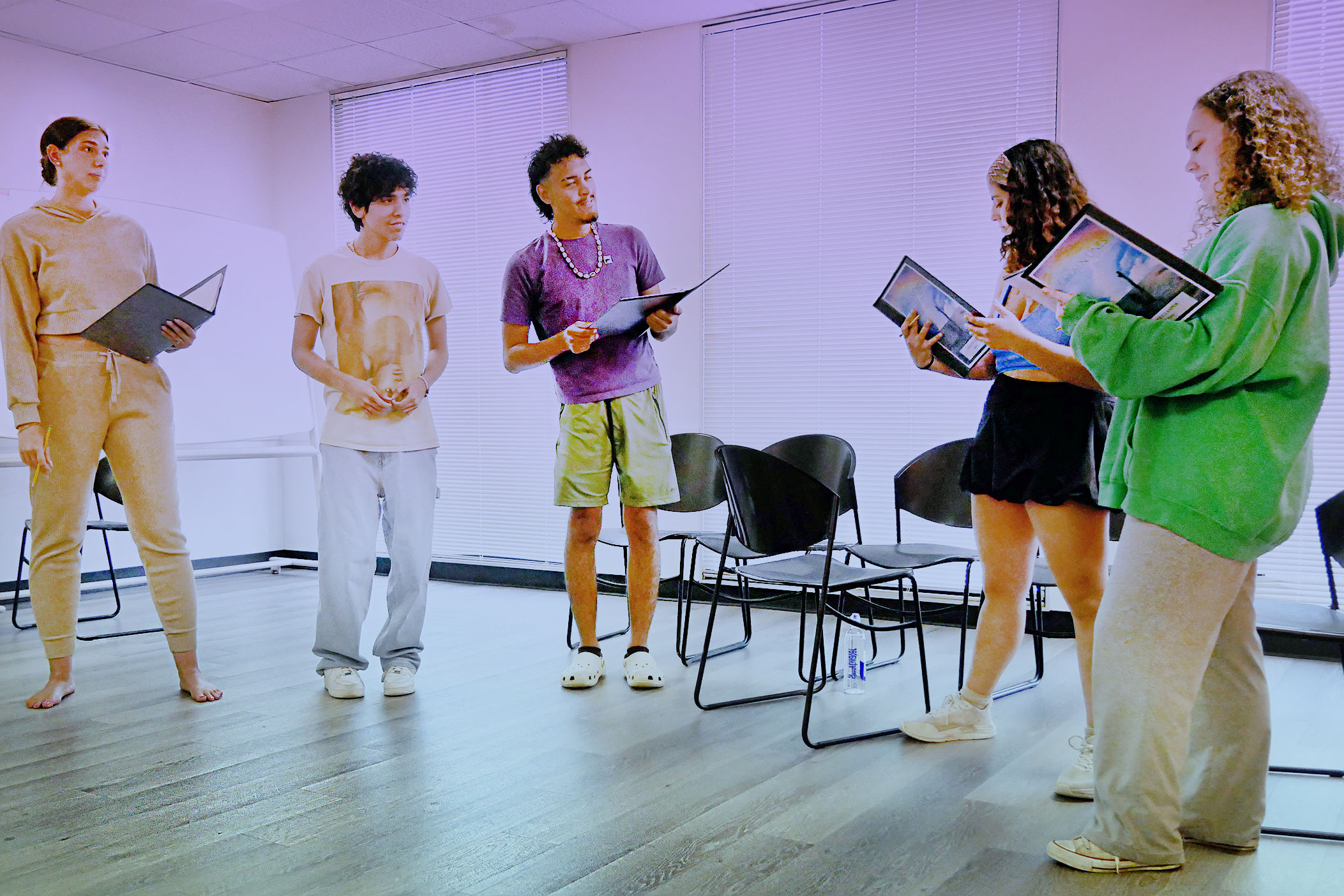The Humans Feels Almost Too Real
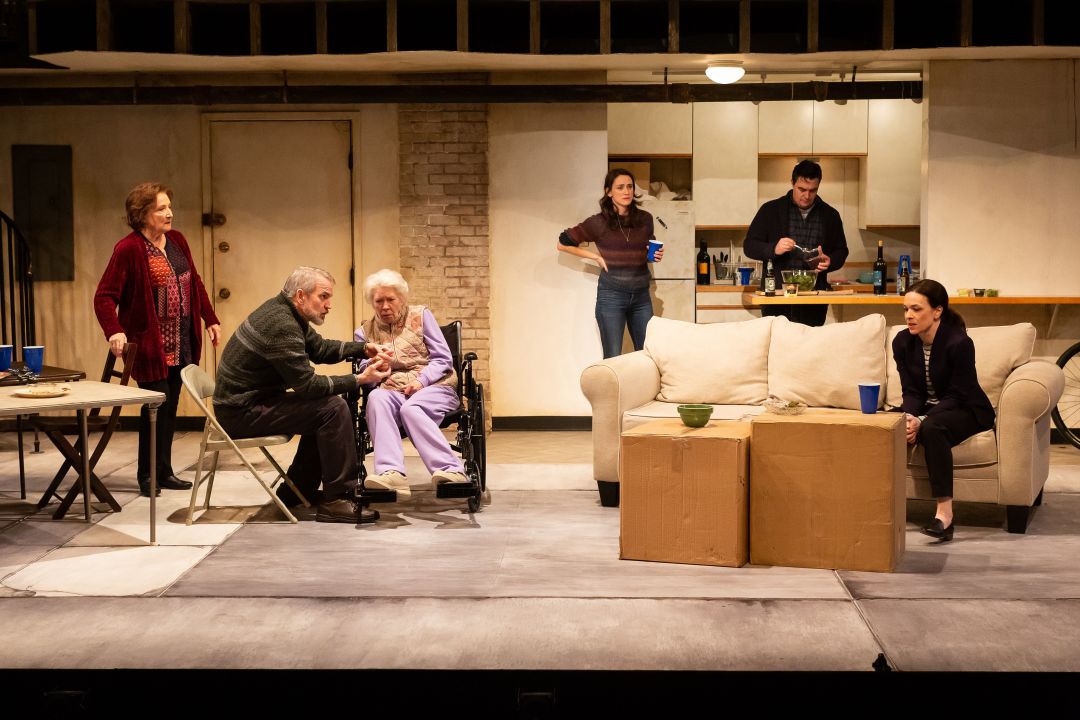
Sharon Lockwood as Deirdre Blake, Steve Key as Erik Blake, Annalee Jefferies as Momo Blake, Elizabeth Stahlamnn as Brigid Blake, Christopher Salazar as Richard Saad and Elizabeth Bunch as Aimee Blake in the Alley’s production of The Humans.
Image: Lynn Lane
When you first see the set of Stephen Karam’s award-winning The Humans, your heart sinks a little. It is a dingy, weirdly designed New York apartment, feeding into the idea that will dominate this play: No matter how aspirational you are, you have to settle.
Brigid Blake (Elizabeth Stahlmann) and her live-in boyfriend, Richard (Christopher Salazar), are moving into the apartment, and everything seems tenuous and provisional. He’s in his late thirties working on a social work degree, waiting for a trust fund that will kick in at 40. Brigid, as we later learn, is a musical composer of some sort, but even though she has gone into debt for a degree, she gets crummy letters of recommendation that leave her bartending. Now they’re having the family over for Thanksgiving, and while there are many laugh-out-loud lines, what we witness at this gathering are the dashed dreams of every member of an American family. So go the ripples of Chekhovian irony and resignation that permeate the play: We try, we fail, the system isn’t for us, but actually against us, and even if we critique it, it is what it is.
Directed by Brandon Weinbrenner, the play’s strength lies in the repartee between family members, and the development of characters that we think we get to know—at least on some level. Eric Blake (Steve Key) is the father of Brigid and Aimee, and in some way this is a father–daughter story. There is some murky acknowledgment that Aimee (Elizabeth Bunch) and Eric were almost victims of 9/11, with the attendant trauma. Hence the refrain that somehow their Pennsylvania home is a better place to be protected from the cruelties of the urban jungle, and maybe even the world, but even that tired assumption proves false: Aimee is a lawyer who is losing her job because she is too sick all the time. The mother, Deirdre (Sharon Lockwood), is an office manager, who is underpaid and underappreciated. See how this works?
You can critique so many elements of American culture: students in debt for worthless degrees; injustice in, of all places, a law firm; realizing the church is the least forgiving institution; and the ridiculous compromises to be made when you are living in New York City, even if it means noisy neighbors and terrible digs. Then there is the rising cost of eldercare, embodied by the presence of Momo (Annalee Jefferies), Erik’s mother, who is in a wheelchair and seems to be almost in a vegetative state. When she’s mentally present, she’s saying things like “how do we get out of here?” When Momo checks out due to dementia, her daughter-in-law says, “I don’t know where she goes,” and neither do we. But what is important in the midst of all of these family disappointments is that it is not, apparently, going to get better. We are all heading where Momo is.
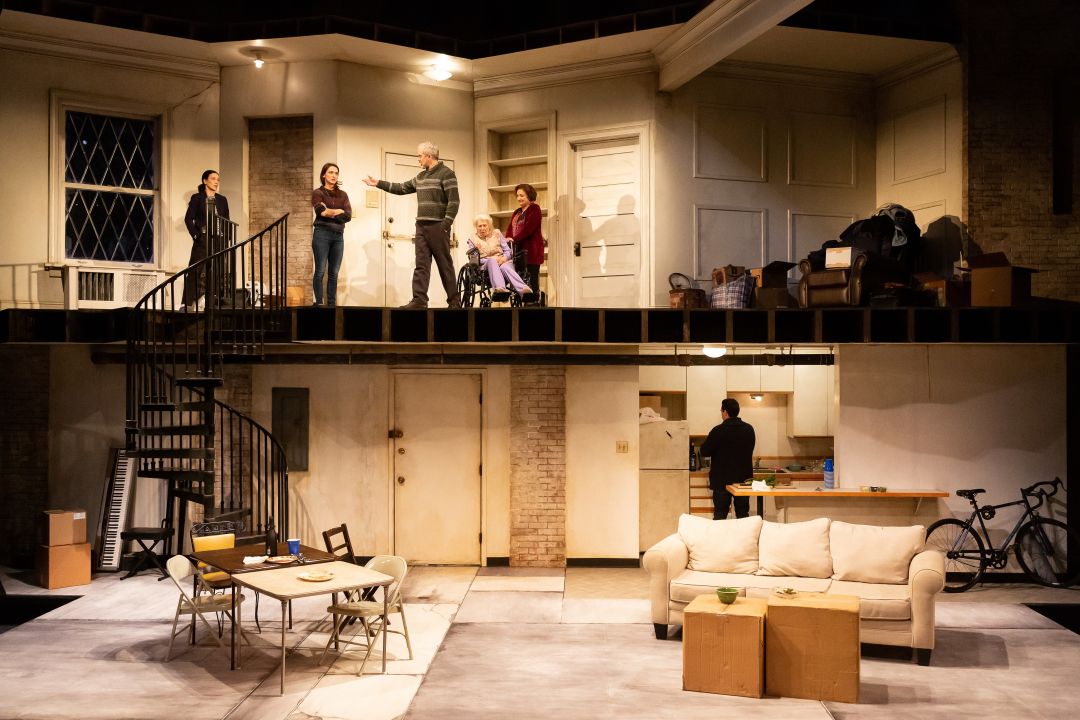
Elizabeth Bunch as Aimee Blake, Elizabeth Stahlamnn as Brigid Blake, Steve Key as Erik Blake, Annalee Jefferies as Momo Blake, Sharon Lockwood as Deirdre Blake and (below) Christopher Salazar as Richard Saad in the Alley’s production of The Humans.
Image: Lynn Lane
These actors work well together as an ensemble for the most part, but everything seems strung out: Aimee’s too-long phone calls, Erik’s wincing because he is in pain and full of fears, and Deirdre’s funny but repeated digs that her daughter should be married, not shacking up. But these actors have a lot demanded of them. One minute I think I am in a contemporary kind of Americanized The Cherry Orchard, the next, I think I am watching a sitcom, as when someone quips that “not even the terrorists want to be in Philly.”
One must mention the lighting design of Lap Chi Chu—there is a lot going on here because lots of things don’t work in this apartment. The Thanksgiving dinner itself is a mix of nostalgia and snark, interlaced with default lip service to the family’s Catholic background. More social satire: The family tradition of banging a Vermont candy pig asks everyone to be thankful just as we learn everything is going pretty much down the tubes. This play is ultimately about the middle class, a group of people whose aspirations are so challenged that living the American Dream—whatever that might be—seems impossible.
There are some great lines, and delivered well most of the time by the cast. But in a random conversation with Richard, Erik talks about his troubling dreams, and Richard talks about monsters and humans. What Karam seems interested in is how each generation trades their own ambitions for survival. It’s shallow and deep all at the same time, and so by the end of the play, we are ready for some kind of resolution, but there is instead a focus on Erik and his fears. That empathy is undercut by some supernatural gimmickry that goes against the grain of the great American tradition of family dramas from Eugene O’Neill, Tennessee Williams, August Wilson, and Arthur Miller.
I still enjoyed watching this family interact, seeing them use the defense mechanisms of sarcasm, do-gooding, and confession, and it is all a striking tableau of the diminishment of American confidence and competence after the violence of 9/11, among other upheavals. A lot of humor and angst is packed into 90 minutes, and it is a testament to our times.
Thru March 24. Tickets from $26. Alley Theatre, 615 Texas Ave. 713-220-5700. More info and tickets at alleytheater.org.
